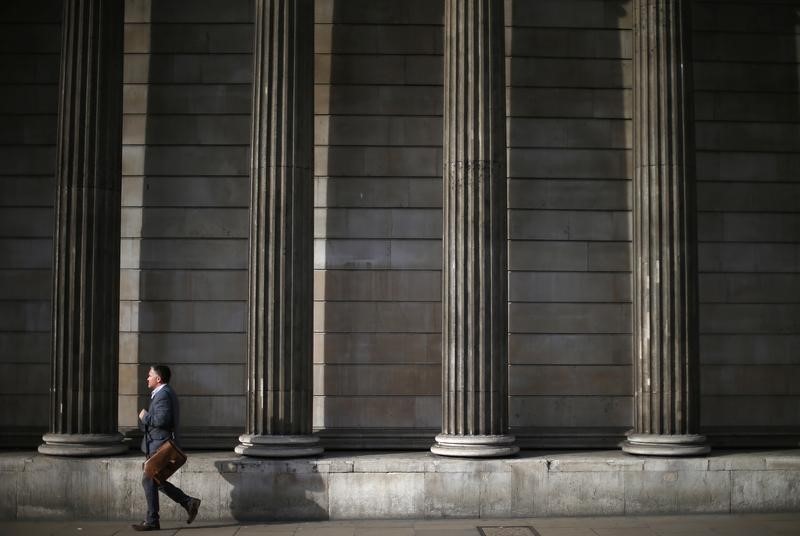By Sumanta Dey
(Reuters) - The first hike in British interest rates will now come in the third quarter of next year, six months later than previously thought, owing to low inflation, sluggish pay growth and a weak euro zone economy, a Reuters poll found.
Thirty-two of 50 economists in the poll conducted this week forecast Bank Rate at 0.75 percent by the end of Q3 2015, breaking a long-standing consensus for a first quarter hike.
That shows economists may finally have narrowed the gap between their expectations and what financial markets are pricing in. Short sterling interest rate futures are fully factoring in the first rise in the fourth quarter of 2015.
"Following the recent downgrade of the BoE's inflation forecasts, which I fully buy into, it is difficult to see the Monetary Policy Committee pulling the interest rate trigger any time soon," said Peter Dixon, economist at Commerzbank.
Britain's economy has enjoyed the fastest growth rate among developed nations much over the past year, prompting economists at one point to predict it will lead the U.S. Federal Reserve in raising benchmark lending rates.
But a bout of disinflation around the globe, stemming from the slowing Chinese and euro zone economies and a plunge in crude oil prices, has dented inflation in Britain, throwing into doubt the timing of the first hike. Wages, meanwhile, have risen only slightly more than inflation.
The Fed is still expected to raise its key interest rate from near zero by June 2015, although that too is becoming less certain despite solid economic performance.
The British economy grew 0.7 percent in the three months to September, data confirmed on Wednesday, although, most of that growth came from household spending instead of business investment which unexpectedly fell.
A dovish set of forecasts from the BoE in its quarterly inflation report, along with inflation itself slowing to near five-year lows recently has also led economists to push a rate hike further out.
"I certainly don't see a rate hike until such times as the inflation rate has stabilised ... particularly in view of the mounting evidence from Sweden that the Riksbank acted too hastily to normalise policy," said Commerzbank's Dixon.
Economists also expect a more gradual pace of tightening. Bank rate is set to rise to 1.00 percent by the end of 2015 and 1.75 percent by end 2016, each a downgrade of 25 basis points since the Oct. 29 poll.
The BoE predicts inflation might fall to below 1 percent over the next six months and may hit its target of 2 percent only towards the end of 2017.
But that did not prevent MPC members Ian McCafferty and Martin Weale from voting for a rate hike at the November policy meeting. The minutes showed that among those voting for steady rates, there was a range of opinion on the balance of risks.

Twenty-six of 33 economists who answered an extra question in the poll said it is more likely that one or more additional MPC members may vote for a hike in Bank Rate rather than one or both of the dissenters stop voting for an increase.
(Polling and analysis by Ishaan Gera and Sarbani Haldar; Editing by Ross Finley and Toby Chopra)